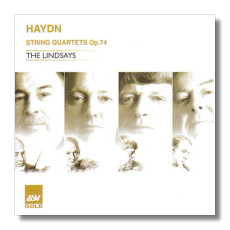
The Internet's Premier Classical Music Source
Related Links
- F.J. Haydn Reviews
- Latest Reviews
- More Reviews
-
By Composer
-
Collections
DVD & Blu-ray
Books
Concert Reviews
Articles/Interviews
Software
Audio
Search Amazon
Recommended Links
Site News
 CD Review
CD Review
Franz Joseph Haydn

String Quartets Op. 74
- Quartet #57 in C Major ("Apponyi" #4), Op. 74 #1 (Hob III:72)
- Quartet #58 in F Major ("Apponyi" #5), Op. 74 #2 (Hob III:73)
- Quartet #59 in G minor "The Rider" ("Apponyi" #6), Op. 74 #3 (Hob III:74)
The Lindsays
Academy Sound & Vision Gold GLD4013 80m DDD
After the success of the three quartets, Op. 64 during Haydn's first London visit of 1791, the composer decided to write six more. The Op. 71 and Op. 74 were composed in 1793 during a relatively sedate period in Vienna. The six works were published in two groups of three in 1795 and 1796 and are dedicated to Count Anton Apponyi, one of Haydn's old friends who in 1785 sponsored his membership into the Masonic Lodge.
The Op. 74 quartets are different from Haydn's earlier works in the genre. While the previous pieces were always intended for private performance, Op. 74 was specifically composed for London's Hanover Square Rooms which could house some 800 people.
Although these compositions are obviously more public in manner, they never trespass the bounds of chamber music. Their conception is bold and spacious with sometimes powerful sonorities that almost pertain to the orchestra. There is virtuosic writing for all the instruments with the violin allocated pride of place. Contrasts of register, texture and dynamics are more flamboyant, popular tunes that could easily be identified by the audience are thrown in for good measure, and a strong sense of adventure in both tonality and modulation is profusely manifested.
This is Haydn at his most innovative best, full of refreshing moments that stimulate and entertain. The Lindsays are certainly at home with these pieces and their spontaneous and convincing performances have a highly communicative power that is magically infectious. It is a real pity that this Quartet from what I have read recently, have come to the end of the road. The informative notes by Richard Wigmore and a wonderfully immediate recording compel me to recommend this CD with confidence.
Copyright © 2005, Gerald Fenech



















